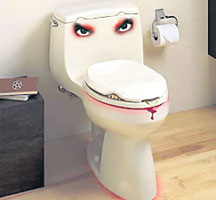
| Toilet terror could make you sick A campaign is being launched in the UK to raise awareness of the crippling impact of toilet phobia. The National Phobics Society in the UK estimates at least four million Britons are affected - but the true number could be many more. In some cases people refuse to leave their homes, and risk their health.
The society has classified the disorder as an anxiety condition in its own right, and is launching a self help book and DVD. Toilet phobia can simply be manifest as a mild distaste for public loos. But some people develop such an intense obsession that they are left housebound, and may refuse to undergo potentially life-saving medical examinations. They may deny themselves fluids, which can harm the kidneys, or take drugs to avoid "accidents". Many sufferers will not even take a job if a toilet is located off a communal area and they can be observed going in or out. And routine situations requiring the provision of a urine sample fill some patients with terror. Experts believe that the stigma surrounding the phobia means that many people refuse to admit they have a problem. Professor Paul Salkovskis, a leading clinical psychologist, said part of the problem was society's squeamishness about going to the toilet. "Around the world we use a lot of humour and euphemism to describe what is a basic human function. "We say 'I'm going to the bathroom' or 'I'm going to powder my nose' because there is a taboo surrounding using the toilet." Several conditions are thought to be behind toilet phobia. These include:
Treatments include cognitive behaviour therapy, which helps people to break the cycle of faulty thinking and hypnosis. -BBC Health |
|
|| Front
Page | News | Editorial | Columns | Sports | Plus | Financial
Times | International | Mirror | TV
Times | Funday
Times | MediScene || |
| |
Copyright
2006 Wijeya
Newspapers Ltd.Colombo. Sri Lanka. |
